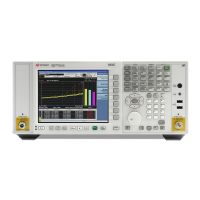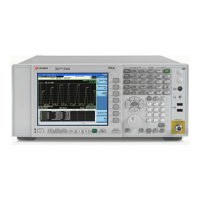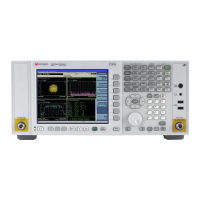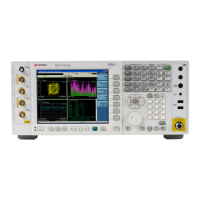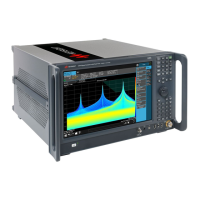3 Spectrum Analyzer Mode
3.2 Swept SA Measurement
Edit Limit
Lets you edit the content and the properties of the Limit Line.
When entering the menu, the editor window (with the limit table) turns on, the
selected Limit is turned On, and the amplitude scale is set to Log. The display of the
trace to which the selected limit applies is turned on (thus, traces in Blank are set to
View and traces in Background are set to On). Turning on the Limit means its display
will be on, and its testing mode will be on as well. You should turn off any other
limits that are on if they interfere with the editing of the selected limit.
NOTE
The table editor will only operate properly if the instrument is sweeping, because
its updates are tied to the sweep system. Thus, you should not try to use the
editor in single sweep, and it will be sluggish during compute-intensive
operations like narrow-span FFT sweeps.
Remote users can enter or access limit line data via the "Limit Line Data
(Remote Command Only)" on page 403 command.
After exiting the editor, the Limit is still on and displayed, and the amplitude scale
remains Log.
Limits are turned off by Preset, but the Limits arrays (data) are only reset (deleted)
by Restore Mode Defaults. They survive shutdown and restarting of the instrument
application, which means they will survive a power cycle.
When editing a limit, the editor remembers which limit and which element in the
limit array you were editing, and returns you to that limit and that element when you
return to the editor after leaving it.
Couplings Turns the ΔLimit Peaks table off
Select Limit
Specifies the selected limit. The term “selected limit” is used throughout this
document to specify which limit is affected by the functions.
Notes The selected limit is remembered even when not in the Limit Menu
Preset Limit 1, not affected by Mode Preset, preset by Restore Mode Defaults
State Saved Saved in instrument state
Go To Row
Lets you move through the table to edit the desired point.
Spectrum Analyzer Mode User's &Programmer's Reference 391
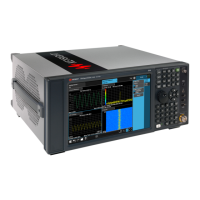
